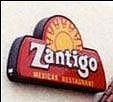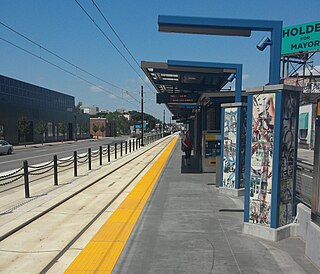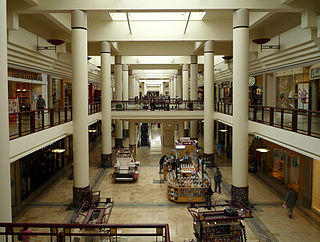
Mall of America (MoA) is a large shopping mall located in Bloomington, Minnesota. Located within the Minneapolis–Saint Paul metropolitan area, the mall lies southeast of the junction of Interstate 494 and Minnesota State Highway 77, north of the Minnesota River, and across the Interstate from the Minneapolis–Saint Paul International Airport. It opened in 1992, and is the largest mall in the United States, the largest in the Western Hemisphere, and the twelfth largest shopping mall in the world.

Fridley is a city in Anoka County, Minnesota, United States. Its population was 29,590 at the 2020 census. It was first settled as a place named Manomin where Rice Creek flows into the Mississippi river and the Red River Oxcart trail crosses the creek. Fridley was incorporated in 1949 as a village and became a city in 1957. It is part of the Minneapolis–Saint Paul metropolitan area as a northern "first-ring" or "inner-ring" suburb. Most of the growth in Fridley occurred between 1950 and 1970. Fridley borders Minneapolis to the southwest. Neighboring first-ring suburbs are Columbia Heights to the south and Brooklyn Center to the west, across the Mississippi River.

Nicollet Mall is a twelve-block portion of Nicollet Avenue running through Downtown Minneapolis, Minnesota, United States. It is a shopping and dining district of the city, and also a pedestrian mall and transit mall. Along with Hennepin Avenue to the west, Nicollet Mall forms the cultural and commercial center of Minneapolis.

Family Dollar Stores, Inc. is an American variety store chain. With over 8,000 locations in all states except Alaska and Hawaii, it was the second largest retailer of its type in the United States until it was acquired by Dollar Tree in 2015 when its headquarters operations were moved from Matthews, a suburb of Charlotte, North Carolina, to Chesapeake, Virginia, located in South Hampton Roads.

SuperAmerica was a chain of refined oil stations and convenience stores in the Upper Midwest, based in Woodbury, Minnesota. It was owned by Marathon Petroleum. The first convenience store opened in the 1960s. SuperAmerica had 278 stores with 271 in Minnesota, 11 in Wisconsin and 2 in South Dakota.
Dayton's was an American department store chain founded in Minneapolis, Minnesota, in 1902 by George Draper Dayton. It operated several local high-end department stores throughout Minnesota and the Upper Midwest for almost 100 years. Although it was regionally known as a high-quality shopping destination, Dayton's is best remembered for starting the discount shopping chain Target. The company was also instrumental in the history of shopping malls, opening the first indoor shopping mall in the United States—Southdale Center in Edina, Minnesota, in 1956.
SuperValu, Inc., was an American wholesaler and retailer of grocery products. The company, formerly headquartered in the Minneapolis suburb of Eden Prairie, Minnesota, had been in business since 1926. It is a wholly owned subsidiary of United Natural Foods (UNFI).

Southdale Center is a shopping mall located in Edina, Minnesota, a suburb of the Twin Cities. It opened in 1956 and is the first fully enclosed, climate-controlled shopping mall in the United States. Southdale Center has 1,297,608 square feet of leasable retail space, and contains 106 retail tenants. The mall is owned by Simon Property Group and the anchor stores are Macy's, Dave & Buster's, AMC Theatres, Hennepin Service Center, and Life Time Athletic.

Euromarket Designs Inc., doing business as Crate & Barrel, is an international furniture and home décor retail store headquartered in Northbrook, Illinois. They employ 8200 employees across over 100 stores in the United States and Canada, with franchises in Central America, South America, Asia and United Arab Emirates.

The Electric Fetus is a record store in Minneapolis, Minnesota. Minnesota Public Radio said the Electric Fetus is "widely regarded as the pre-eminent indie record store in Minnesota." Owner Keith Covart estimates that the store has an inventory of approximately 50,000 titles.

The Mississippi National River and Recreation Area is a 72-mile (116 km) and 54,000-acre (22,000 ha) protected corridor along the Mississippi River through Minneapolis–Saint Paul in the U.S. state of Minnesota, from the cities of Dayton and Ramsey to just downstream of Hastings. This stretch of the upper Mississippi River includes natural, historical, recreational, cultural, scenic, scientific, and economic resources of national significance. This area is the only national park site dedicated exclusively to the Mississippi River. The Mississippi National River and Recreation Area is sometimes abbreviated as MNRRA or MISS, the four-letter code the National Park Service assigned to the area. The Mississippi National River and Recreation Area is classified as one of four national rivers in the United States, and despite its name is technically not one of the 40 national recreation areas.

Zantigo is an American fast food restaurant chain serving Mexican food. It began operation in 1969 in Minneapolis, Minnesota as Zapata. With over 80 locations at its peak, Zantigo, alongside its sister/parent company Kentucky Fried Chicken, was sold to PepsiCo, with the former being merged into Taco Bell in 1986. Zantigo was re-established a decade later under new ownership in the Twin Cities market.

Snelling Avenue station is a light rail station along the Metro Green Line in Saint Paul, Minnesota. It is located along University Avenue on either side of the intersection with Snelling Avenue. The station has split side platforms, with the westbound platform on the north side of the tracks west of Snelling and the eastbound platform on the south side of the tracks east of the intersection.
Donaldson's, previously known as the L. S. Donaldson Company, headquartered in Minneapolis, Minnesota, is a defunct department store company.

Bob's Stores was a chain of retail stores in the northeastern United States owned by GoDigital Media Group. Founded as Bob's Surplus in Middletown, Connecticut, by Robert "Bob" Lapidus in 1954, the chain expanded gradually until it was acquired by Melville Corporation and has been reacquired five more times since then. The chain targets moderate-income customers with a selection of footwear, workwear, teamwear, and activewear.

Rosedale Center, known as Rosedale, is a shopping center in Roseville, Minnesota. The mall is centrally located between the Twin Cities of Minneapolis and St. Paul, surrounded by suburbs and close to major highways, and serves a trade area population almost 2 million people. It is #2 in mall foot traffic behind the Mall of America.

Maplewood Mall is a super-regional shopping mall in Maplewood, Minnesota, United States. It is near Interstate 694 on the Saint Paul side of the Twin Cities metropolitan area. Maplewood Mall opened in 1974. It was later renovated and expanded in 1996. It is managed by Washington Prime Group of Columbus, Ohio. The mall's anchor stores are Barnes & Noble, JCPenney, Kohl's, and Macy's with one vacant anchor last occupied by Sears.

Southtown Center, colloquially known as Southtown, is a regional shopping mall in Bloomington, Minnesota, a suburb of the Twin Cities. Southtown Center consists of 534,650 square feet (50,000 m2) of retail space. The center contains 38 retail tenants and is anchored by AMF Bowling Centers, Kohl's, and TJ Maxx.
Rainbow Foods was a supermarket chain in Minnesota. Founded in 1983, it operated more than 40 stores across the state at its peak and was the second-largest grocery store chain in the Twin Cities, behind Cub Foods. However, the arrival of other grocery stores in the market, such as Aldi and Hy-Vee in the 2000s and 2010s caused the grocery store chain to shrink to 27 locations by May 2014. Soon after, nine more closed and eighteen were sold by then-owner Roundy's; only six of these kept the Rainbow name.

The FBI and ATF tracked 164 structure fires from arson that occurred May 27–30, 2020, during the George Floyd protests in Minneapolis–Saint Paul. Rioters started fires by igniting flammable materials within or next to buildings and in some cases by deploying Molotov cocktails. Property locations were damaged by spreading flames, heat, and smoke, and by suppressant waters from fire hoses and fire sprinkler systems. Many of the impacted structures suffered heavy damage or were destroyed, with some being reduced to piles of rubble after collapsing.
















